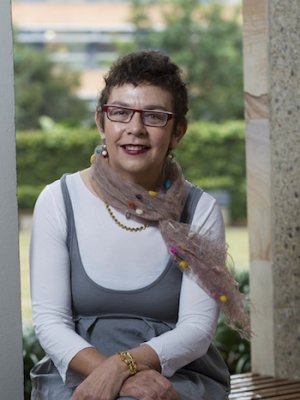
What started as Donna McDonald’s pursuit for personal knowledge became a public desire to have people listen to her.
Dr McDonald was born deaf and attended the School for the Deaf for five years as a child, before going on to All Hallows to complete her schooling.
Today she has two undergraduate degrees, a masters, and will today (22 July) graduate with a Doctor of Philosophy (PhD) from The University of Queensland (UQ).
“I decided to undertake a PhD because I wanted to get a better understanding of the impact of my deafness on my life. I also had a curiosity about other people’s experiences of being deaf,” Dr McDonald said.
“I had so much I wanted to say about my life and experiences as a deaf girl and a deaf woman, and I felt that having a PhD would ensure people would listen to me.”
Through the School of English, Media Studies and Art History, Dr McDonald’s PhD program involved the production of two pieces of writing: an exploratory memoir of how her deafness influenced her life – ‘The Art of Being Deaf’; and an accompanying critical essay – ‘Hearsay: how stories of deafness and deaf people are told.’
Dr McDonald’s intelligence, enthusiasm and determination not only helped her understand the challenges of being deaf, but also sustained her commitment to undertaking chemotherapy treatment and stem cell transplant for Non Hodgkin’s Lymphoma during her PhD.
When describing her work, Dr McDonald is nothing but passionate.
“My creative work, ‘The Art of Being Deaf’, is a personal memoir of deafness, which I developed in response to a commonly asked question, “Your deafness must have had a big impact on your life?” she said.
“I discuss certain experiences in my life with the purpose of better understanding my relationship with my deafness and my relationships with others.
“In my essay, ‘Hearsay’, I examine representations of deafness and deaf people in fiction and memoir, and consider literature’s influence in shaping perceptions of deaf people, for both deaf and hearing readers."
What started as a pursuit for personal knowledge became a desire to have people listen – something Dr McDonald accomplished last year in UQ’s Three Minute Thesis (3MT) competition.
Dr McDonald won the Arts Faculty competition and progressed to the UQ Final of the academic speaking competition.
Dr McDonald also had an essay, ‘I Hear With My Eyes,’ published by Julianne Schulz in the Griffith Review in 2006. This was subsequently republished in an anthology of life writing and memoirs by GR and ABC Books in ‘A Revealed Life’ in early 2007. A sequel to this essay, ‘The Reluctant Memoirist’, will be published by Griffith Review in August 2011.
Dr McDonald has completed a Bachelor of Arts and a Bachelor of Social Work from UQ, as well as a Masters in Arts (Creative Writing) from QUT, and her PhD from UQ where she was supervised by her mentors, Dr Stuart Glover (EMSAH) and Professor Merv Hyde (Griffith University).
“Their encouragement of my writing combined with the interest that had been generated by the publication of my essay led me to tackle the task of writing a book-length version of that essay,” Dr McDonald said.
Dr McDonald now has a role at Griffith University as a Senior Lecturer & Convenor Disability Studies in the School of Human Services and Social Work.
UQ’s research higher degree programs include the Doctor of Philosophy (PhD) and Master of Philosophy (MPhil). To find out more about research opportunities at UQ, contact the Graduate School UQ Advantage team at uqadvantage@gradschool.uq.edu.au or phone 07 3346 0508.
Media: Carly Dengate, (07) 3346 0509, c.dengate@uq.edu.au.
About the UQ Graduate School
A Doctor of Philosophy (PhD) is one of the highest degrees that can be awarded. It is an advanced academic qualification seen as a requirement for the majority of academic and research positions. PhD students conduct a research project, generally over a 3 to 4 year period, which involves formulation and identification of a significant problem, development of conceptual and methodological skills, and contribution of new knowledge.
A Master of Philosophy (MPhil) is also a postgraduate research degree involving a significant project, which requires students to develop and enhance analytical and research skills through independent investigation. Usually conducted between 15 and 18 months, students develop specialist knowledge.
A PhD or MPhil can be completed in any field; from arts to social science, to nanotechnology or sustainable development. Research higher degrees allow greater opportunity and choice, enable the pursuit of altruistic endeavours, enhance career focus, and create the next generation of innovators.
Over 4,000 students are undertaking a research degree at UQ are supported by the UQ Graduate School which focuses on enriching the quality of academic life; providing high standards if supervision, and assisting RHD students throughout their degree and in career opportunities in academia, industry, or government.
The Graduate School coordinates year-long Skills Training programs, Graduate Student Week events, an annual Three Minute Thesis (3MT™) competition, and research commercialisation training.
UQ has supported over 13,000 students to complete their research degree.
.jpg)



